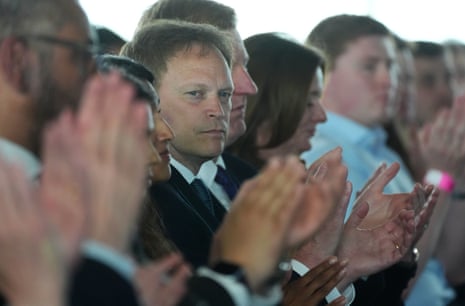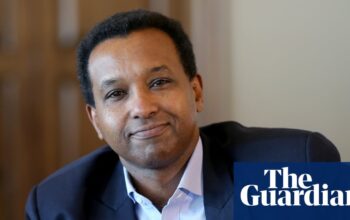And in the Conservative party’s manifesto published yesterday, the military option is described as “a year-long full-time placement in the armed forces or cyber defence”.
The assumption that 30,000 18-year-olds would serve a year in the armed forces under the plan largely explains why Labour has been saying the plan would cost double the £2.5bn set aside for it by the Tories.
But in an interview this morning, when asked about the cost of the plan, Shapps, the defence secretary, said the people doing the military option would only serve for 25 days. He said:
It’s not as you present it, 30,000 people for over an entire year. It’s 25 days a year for those 30,000 – and I think those places will be massively sought after.
Responding for Labour, Jonathan Ashworth, the shadow Cabinet Office minister, said Shapps’ comments showed the policy was in disarray. He said:
The defence secretary has completely blown up the prime minister’s flagship manifesto commitment. Where Rishi Sunak has said 30,000 young people would serve for twelve months in the armed forces under his national service scheme, Shapps has now said they will only serve 25 days.
This is what happens when you have a Conservative party making up policy as it goes along, and working out how much their pledges will cost the taxpayer after they’ve already been announced. It is a symbol of the utter desperation at the heart of this Conservative campaign, and the chaos at the heart of their government.

Filters BETA
3.23pm.) As the BBC reports, a spokesperson for Jenkyns saaid:
Andrea is above all, a patriot.
She fought for Brexit alongside politicians from all parties including Labour and Reform and is proud of being able to transcend party politics and put the country first.
She finds it regrettable that party leaders have not been able to see the bigger picture in uniting the right to stop a socialist supermajority.
After the election, Conservative MPs will need to work with a wider conservative movement to achieve their goals and Andrea is one of the best-placed genuine conservatives in her party to help facilitate this.
For the avoidance of any doubt, Andrea is a lifelong conservative and is standing for the Conservative party in the forthcoming election.
She is committed to promoting low-tax, common-sense conservatism.
There is a live debate within the Conservative party about whether, after what is seen as the inevitable election defeat, Tories should unite with Nigel Farage and his party or continue to fight against them. It is clear what Jenkyns thinks.
Nigel Farage.
In response to controversy about the leaflet, which implies she has been endorsed by Farage’s party, Reform UK, even though it is running a candidate against her, she posted this on X.
Lots of excitement over my leaflet today… All conservatives must be prepared to come together to prevent a socialist supermajority and the end of Britain as we know it.
Leeds South West and Morley is a new seat, overlapping with much of Morley and Outwood, the old seat represented by Jenkyns. According to the latest YouGov MRP poll, Labour is on course to beat Jenkyns easily, by 49% to 28%.
9am) means it is safe for people to vote SNP in Scotland because they will still get a Labour government.
Martin Docherty-Hughes, who is seeking re-election for the SNP in West Dunbartonshire, said:
Grant Shapps has confirmed what the SNP has been saying for quite some time now: the Tories are toast. This is no longer an election, it’s a coronation.
The real choice now for Scottish voters is who is best placed to represent their values and interests, and who will stand up for them at Westminster when £18bn of public service cuts come hurtling down the line.
The real choice is whether we give Sir Keir Starmer a free pass to impose more public service cuts, or whether we have a strong Scottish voice there to stop him.
The SNP is also pointing out that a few months ago, based on what the polls were suggesting, Prof Sir John Curtice, the elections specialist, said Labour did not need to win a single seat in Scotland to get a substantial majority.
Rishi Sunak announced the surprised national service plan at the start of the election campaign, he said: “We will introduce a bold new model of national service for 18-year-olds, to be spent either in a competitive, full-time military commission over 12 months, or with one weekend per month volunteering in the community.”
And in the Conservative party’s manifesto published yesterday, the military option is described as “a year-long full-time placement in the armed forces or cyber defence”.
The assumption that 30,000 18-year-olds would serve a year in the armed forces under the plan largely explains why Labour has been saying the plan would cost double the £2.5bn set aside for it by the Tories.
But in an interview this morning, when asked about the cost of the plan, Shapps, the defence secretary, said the people doing the military option would only serve for 25 days. He said:
It’s not as you present it, 30,000 people for over an entire year. It’s 25 days a year for those 30,000 – and I think those places will be massively sought after.
Responding for Labour, Jonathan Ashworth, the shadow Cabinet Office minister, said Shapps’ comments showed the policy was in disarray. He said:
The defence secretary has completely blown up the prime minister’s flagship manifesto commitment. Where Rishi Sunak has said 30,000 young people would serve for twelve months in the armed forces under his national service scheme, Shapps has now said they will only serve 25 days.
This is what happens when you have a Conservative party making up policy as it goes along, and working out how much their pledges will cost the taxpayer after they’ve already been announced. It is a symbol of the utter desperation at the heart of this Conservative campaign, and the chaos at the heart of their government.
9am.) In Wales Plaid Cymru is trying the same tactic. Its leader, Rhun ap Iorwerth, has written an open letter to Labour supporters urging them to back his party to hold Labour to account. He says:
In 1997, Tony Blair secured a sweeping majority. There was a sense of real change on offer. More than a quarter of a century later, we face a similar scenario whereby a UK Labour government seems inevitable after 14 years of a disastrous Tory administration.
There is, however, a palpable sense that the change on offer by Labour this time around doesn’t amount to the kind of radical change we need.
The bold, ambitious ideas required to rebuild our economy after the chaos of Trussonomics, the courage to speak out when Farage and his ilk spread their lies about immigration, and the compassion to scrap the two-child benefit cap are nowhere to be seen.
Every single poll tells us that the Tories are finished, so this election most also be an opportunity to constructively hold an incoming Labour government to account.
If you believe in the values of social justice, international peace, economic fairness for Wales and support the right of local voices to be heard, I ask you to consider supporting Plaid Cymru at this election.
The more Plaid Cymru MPs we have in Westminster, the more likely it is that Wales’s voice will be heard and our nation’s needs no longer ignored.
its assessement of the Green party’s manifesto. The plans would “see the size of the state increase on an unprecedented scale”, the IFS says. It argues that some of their tax plans look sensible, but that they would not raise as much as the party claims, and that there would be an economic cost.
Here is an extract.
Many of the measures would combine to increase disincentives to work and to invest. Accounting for the fact that we would expect potentially large responses to such a significant increase in taxes, it is unlikely that the measures would raise as much revenue as expected. And while some of the measures are targeted at the wealthy, the effects of the package would be much broader. Most obviously, it would be impossible to raise over £90 billion from taxing carbon emissions without the effect being felt by everyone.
It is clear where the Green Party’s ambitions lie – a much bigger role for the state, better funded public services, and, of course, a swifter transition to net zero. It is unlikely that the specific tax raising measures they propose to help achieve all this would raise the sorts of sums they claim – and certainly not without real economic cost.
If you want to contact me, please post a message below the line (BTL) or message me on X (Twitter). I can’t read all the messages BTL, but if you put “Andrew” in a message aimed at me, I am more likely to see it because I search for posts containing that word. If you want to flag something up urgently, it is best to use X; I’ll see something addressed to @AndrewSparrow very quickly. I find it very helpful when readers point out mistakes, even minor typos (no error is too small to correct). And I find your questions very interesting too. I can’t promise to reply to them all, but I will try to reply to as many as I can, either BTL or sometimes in the blog.
thrown at Farage while he was on top of a party battlebus in Barnsley, South Yorkshire, on Tuesday.
This followed an incident last week in which a milkshake was thrown over Farage as he left the Moon and Starfish Wetherspoon’s pub in Clacton-on-Sea in Essex. Two people have been charged over the incidents.
According to the PA news agency, it is understood that the Home Office has been in touch with the Reform UK leader to offer additional private security.
Police officials say it is difficult to work out the intentions of people in crowds when would-be MPs are out campaigning, but that the candidates may not want to be put in a bubble as they try to speak to the public.
Gavin Stephens, chairman of the National Police Chiefs’ Council (NPCC), said it was “really important” the election campaign was “peaceful and well run” and “policing has a strong role to play in that”.
Stephens told reporters at a briefing on Wednesday:
There has been a period where we have seen murders of people who are elected into office. And that is a threat that we want to bring all of our resources to bear to counter the change in sort of societal hostility, the lack of tolerance.
Understanding the spill over of polarised issues into threats of violence is clearly something where policing has a very strong role to take … What I am clear on is the policing has a very strong role to play in our primary mission of keeping the King’s peace.
And throughout this campaign activity it’s really important to us and all of our local communities that it’s a peaceful and well run campaign that democracy can function well, and we recognise that policing has a strong role to play in that.”
The Home Office offers basic security guidance and briefings to all candidates and consider requests for additional, enhanced security measures on a case-by-case basis.
The PA news agency reports that the government has allocated £31m for protective security measures for elected representatives and candidates.
Green party are offering “exactly the type of policies needed to transform the workplace in Britain”.
Responding to the Green party’s manifesto launch today, Will Stronge, director of research at the Autonomy Institute said:
A four-day working week, £15 an hour minimum wage and 10:1 pay ratios are exactly the type of policies needed to transform the workplace in Britain.
The Green party can’t win the election but we wouldn’t be surprised if the policies they have announced today end up being taken up and adopted by the next government.
British workplaces are in desperate need of radical change and these policies lay the foundations for a better future of work.”
The SNP and Labour have drawn even in Scotland in Westminster voting, a poll suggests.
A survey by Ipsos for STV spoke to 1,150 people across the country between 3 and 9 June and found both parties level on 36%.
The PA news agency reports that the SNP has dropped three points compared with the firm’s last poll in January, while Labour have increased their vote by 4%. The Tories sit on 13% while the Lib Dems and Scottish Greens are on 5% and 3% respectively – with all three dropping a single point since January.
Reform UK have also increased their vote by one point to 4%, while Alba remain on 1%.
Every leader in Scotland received a negative net approval rating, with Scottish Labour leader Anas Sarwar recording -1% compared with -2% for first minister John Swinney.
Scottish Conservatives’ Douglas Ross’s rating was -29% – although the question was asked before he announced his intention to stand down, reports the PA news agency.
Prime minister Rishi Sunak also proved intensely unpopular with respondents, with 79% reporting they were dissatisfied with his performance, achieving a net rating of -64%. Labour leader Keir Starmer’s rating was -12%.
Speaking to the PA news agency, Swinney said he was “encouraged” by the poll. He said:
This is a very different poll to the ones we’ve seen up until now which I think indicates the SNP is engaging strongly with the public.
But we’ve got three more weeks to go, we’ve got a lot to set out to the public before polling day.
We’ll be doing that because I want people in Scotland to understand that only by having SNP MPs in Westminster will they be protected from the austerity that the Labour party is now proposing to deliver on the people of our country.”
Meanwhile, Scottish Tory chairman Craig Hoy said:
Voters know that in key seats across Scotland it’s a straight fight between the Scottish Conservatives and the SNP – and these battles will be extremely close.
Stephen Flynn has said that every SNP MP elected will double down on their independence obsession, instead of focusing on the people’s priorities – fixing Scotland’s ailing public services and creating good jobs.
The only way to stop this is to defeat the SNP – and that means voting Scottish Conservative in the seats where only we are capable of beating them.”
Elsewhere, support for independence among the respondents sat at 51% among decided voters, compared with 49% of those opposed. The PA news agency reports that the poll also suggested a soft vote that could lean heavily to Labour.
According to the PA, 55% of respondents said they had definitely decided where their vote would go, but of those who said they had not, 24% said they could move to Labour.
Of those who said they would vote SNP, 64% said they would definitely do so, compared with 55% for Labour and 43% for the Conservatives.
Emily Gray, the managing director of Ipsos in Scotland, said even small moves in vote share could make a “big difference” to the final result given the profile of marginal constituencies and parties have “a huge amount to play for in the remaining weeks of the campaign”.
Green party election manifesto.
It’s a handy and concise guide which fills you in on the main points of the party’s election manifesto titled Real Hope, Real Change:
The Greens have launched their election manifesto with an appeal to voters to help them into parliament as a challenge to what they termed the unambitious, “more of the same” policies of Labour.
Setting out their plans in Brighton and Hove, the location of one of the party’s key target seats, the co-leaders, Carla Denyer and Adrian Ramsay, said their proposals for higher taxes – mainly on wealthier people – were the only realistic way to improve public services and undertake vital environmental policies.
“This manifesto isn’t more of the same,” Ramsay told a crowd of activists at the Sussex county cricket club ground. “It’s a look at what things could be like – and soon, if we’re willing to invest at the rate necessary – and to be bold and ambitious.”
He added: “We reject the pessimism of the other parties who don’t believe we can safeguard our publicly funded health system, that we can’t provide warm and secure homes for everyone, that tackling the climate crisis is too challenging for us.”
Setting out ideas including a four-day working week, the nationalisation of water and energy firms, and mass-scale plans to build new homes and insulate existing ones, Denyer said the UK should not accept “an economy when most people are working harder and yet getting poorer”.
She accused the Conservatives and Labour of “a race to the bottom on tax” and went on: “They think that people don’t cotton on that this means even more devastating cuts to public services, like the NHS, that we rely on every day.”
Other policies set out in the manifesto, titled Real Hope, Real Change, include a maximum 10:1 pay gap ratio for both public and private companies; rent controls; a £49bn investment programme over the next five years to insulate homes and public buildings; and a plan to let councils requisition empty properties or ones without proper insulation.
The plans would be financed by tax changes including a wealth levy of 1% on individual taxpayers with assets worth £10m or more, rising to 2% for those with assets above £1bn. Capital gains tax would be aligned with income tax, and higher earners would pay more national insurance.
Rishi Sunak insisted he had “absolutely not” lost hope of winning the general election as Tory allies warned about the risk of Labour winning a “supermajority”.
The prime minister warned against giving Keir Starmer a “blank cheque” if he won power, but stressed that he was still hopeful of victory.
His comments came after defence secretary Grant Shapps suggested the Tories were now fighting to prevent a 1997-style Labour landslide.
The PA news agency reports that when asked by journalists if the change in tone showed the Tories had conceded defeat, Sunak said:
No absolutely not. What you saw yesterday is we’ve put a manifesto forward which has got a very clear set of tax cuts for the country, tax cuts at every stage of your life.
Whether you’re working or setting up a small business, tax cuts when you’re trying to buy your first home, tax cut for pensioners, and tax cuts for families.
And I’m really energised to now have a chance to put a very clear plan to the country and talk about all the things I want to do.”
He added that the manifesto showed a “clear direction of travel” that the Tories would take if they win the election.
Source: theguardian.com


